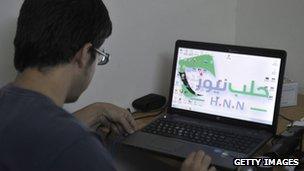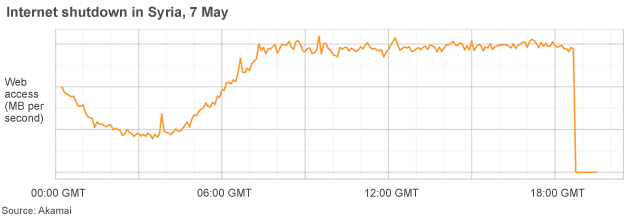Syrian internet back after 19-hour blackout
- Published

Activists and journalists in Syria rely on the internet to get out news and footage to the wider world
The internet in Syria appears to have returned after a nationwide blackout knocked the country offline for more than 19 hours.
Monitoring company Renesys noted signs of activity at around 14:30 GMT (17:30 local time) on Wednesday.
Local state-run media had reported earlier that a "fault in optical fibre cables" was to blame for the blackout.
However, experts dismissed this explanation as "unlikely".
David Belson, of Akamai, said: "Our monitoring shows that Syria's international internet connectivity is through at least four providers, and published submarine cable maps show connectivity through three active cables.
"As such, the failure of a single optical cable is unlikely to cause a complete internet outage for the country."
Syria last experienced a shutdown for three days last November. Activists say the regime of President Bashar al-Assad is attempting to "silence" rebel communications.
Immediate drop
The Syrian government blamed that incident on "terrorists", but internet experts said it was more likely that the regime had shut down the web.
The government has been fighting a bloody internal conflict for two years.
Activists suggested at the time of the previous internet shutdown that the regime might have been planning a major offensive, or that it might have been attempting to prevent rebels from using the internet to co-ordinate themselves and communicate with the wider world.

However, neither theory was substantiated.
US web companies, including Renesys and Akamai, logged the latest blackout late on Tuesday.
Google, which monitors connections to its network of services, such as YouTube and Gmail, also noted an almost immediate drop on Tuesday, external.
'Deliberate attempt to silence'
Syrian residents confirmed the blackout, but said mobile phones and landlines were still able to work normally.
A digital rights campaign group, the Electronic Frontier Foundation, said the internet was a vital resource for activists in the country.
"We're deeply concerned that this blackout is a deliberate attempt to silence Syria's online communications and further draw a curtain over grave events currently unfolding on the ground in Syria," it said in a statement.
"While heavily censored, monitored and compromised, the internet has served as an important window connecting the world at large to Syria, and one way that international observers could connect with individuals on the ground in that country.
"A number of activists on the ground in Syria have access to internet via satellite links, which can connect them to the internet but carries a high risk for detection, which can be life-threatening."